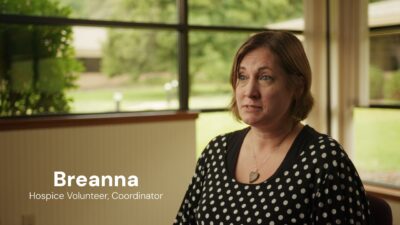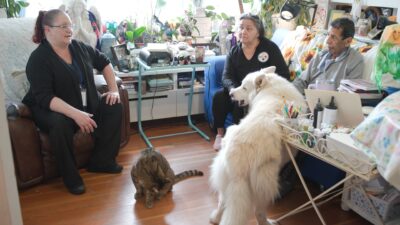Have questions? We can help.
Read common questions we receive and answers from our experts.
Hospice Foundation of America provides confidential guidance to patients, families, and healthcare and social service professionals regarding care at the end of life and bereavement. HFA is not a direct service healthcare provider and does not monitor or regulate hospice providers. Information and education provided through this service does not establish a patient-client relationship.
How hospice helps
When serious illness strikes, most patients and their families initially hope to stop or alter its course by exploring aggressive or invasive treatments. At the end of life, most people hope for quality of life, comfort, peace, and to be near loved ones and familiar possessions. Hospice helps to achieve those goals.
With hospice, your mother’s quality of life will be the top priority. A physician and a registered nurse will oversee management of pain and other symptoms, while a team of professionals provides support with daily functions and non-medical care, as well as psychosocial and spiritual needs.
Hospice does not speed up or delay the dying process. The focus of hospice care is solely to relieve symptoms such as pain, anxiety, and breathlessness at the end of life, allowing natural death to occur in peace and with dignity. The medications used at end of life are for symptom relief only and are never used to hasten death.
Yes, he can. Hospice encourages the patient’s family doctor or specialist to remain engaged in their care. The hospice physician will communicate with your father-in-law’s family doctor, who may know the patient better (medically) than anyone else, to determine the specific medical needs addressed in his individual plan of care.
Other resources you may find helpful
What do hospice volunteers do?
Hospice volunteers are an integral part of the hospice team. Watch this 5-minute video to hear personal experiences of hospice volunteers at Hospice of Michigan. Are you ready to become a hospice volunteer?
Improving Dying
HFA recently profiled end-of-life care innovations during a continuing education course, Improving Dying, which showcases exceptional care programs that are enhancing care for patients, families, and even entire communities. These special programs go the extra mile to provide excellent patient care, ease caregiving and grief, and raise public awareness of the humanity and dignity that…
No Final Goodbye
My dad was in hospice care. He was conscious but weakening daily. As death approached, we kept a death watch. Yet, one night, my dad suggested that we all go to sleep. He seemed to be a bit stronger, so we agreed. Unfortunately, he died quietly in his sleep that night. My sister was deeply…



